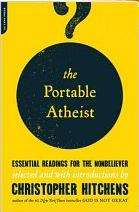The Portable Atheist
 | |
| Editor | Christopher Hitchens |
|---|---|
| Country | United States |
| Language | English |
| Subject | Atheism |
| Publisher | Da Capo Press |
Publication date | November 2007 |
| Media type | Softcover, Audiobook |
| ISBN | 978-0-306-81608-6 |
| OCLC | 156811900 |
The Portable Atheist: Essential Readings for the Non-Believer (2007) is an anthology edited by Christopher Hitchens, the #1 New York Times best-selling author of God Is Not Great. He was a contributing editor to Vanity Fair. Hitchens wrote introductions to each article he compiled for the book. The main introduction is centered on an unbeliever´s point of view, what he is constantly told, “and the errors incurred by religion, since the pre-history of our species, in identifying not just the wrong explanation but the wrong culprit in episodes of nightmarish ignorance and calamity”.
In an inciting anthology of atheist and agnostic thought, going back to the early Greeks, Hitchens writes briefly about the selected essays of past and present philosophers, scientists, and other thinkers such as Lucretius, Benedict de Spinoza, Charles Darwin, Karl Marx, Mark Twain, George Eliot, Bertrand Russell, Emma Goldman, H. L. Mencken, Albert Einstein, Daniel Dennett, Sam Harris, Victor J. Stenger and Richard Dawkins − with original pieces by Salman Rushdie, Ian McEwan, and Ayaan Hirsi Ali. For Hitchens “religion invents a problem where none exists by describing the wicked as also made in the image of god and the sexually nonconformist as existing in a state of incurable mortal sin that can incidentally cause floods and earthquakes.[1] Death is certain... Life on this earth, with all its mystery and beauty and pain, is then to be lived far more intensely: we stumble and get up, we are sad, confident, insecure, feel loneliness and joy and love. There is nothing more; but I want nothing more.”[2]
Overview
Atheism itself is just the absence of belief in gods. Well known for his own atheist book God Is Not Great, Hitchens treads some very heavily-traveled ground here in editing a compendium of atheist writings.[3] For Hitchens, arguments for atheism can be divided into two main categories: those that dispute the existence of god and those that demonstrate the ill effects of religion.[4] “Religion” – he defines – “is, after all, more than the belief in a supreme being. It is the cult of that supreme being and the belief that his or her wishes have been made known or can be determined”. He mentions great critics such as Thomas Jefferson and Thomas Paine, who perhaps paradoxically regarded religion as an insult to god.
"An agnostic does not believe in god, or disbelieve in him", writes Hitchens. Non-belief is not quite unbelief, he explains. “One is continually told, as an unbeliever”, — he writes — “that it is old-fashioned to rail against the primitive stupidities and cruelties of religion because after all, in these enlightened times, the old superstitions have died away.[5] Nine times out of ten, one will be told not of some dogma of religious certitude but of some instance of charitable or humanitarian work undertaken by a religious person. Of course, this says nothing about the belief system involved”. Hitchens points that if Louis Farrakhan's Nation of Islam succeeds in weaning young black men off narcotics, this would not alter the fact that the NoI is a racist crackpot organization. He reminds that Hamas – which publishes The Protocols of the Learned Elders of Zion on its website — won a reputation for its provision of social services. He challenges: which ethical statement made or which action performed by a believer could not have been made or performed by a non-believer?
Editorial reviews
Hitchens... is a formidable intellectual who finds the notion of belief in God to be utter nonsense. The author is clear in his introduction that religion has caused more than its fair share of world problems. The readings Hitchens chooses to bolster his atheist argument are indeed engaging and important.— Publishers Weekly[6]
Hitchens believes we will never cure ourselves of this belief in the divine and the only hope of salvation lies in "our contempt for our own weakness". At 500 pages this excellent anthology is only just portable, but it is the perfect Christmas stocking-filler for the atheist in your life.— PD Smith, The Guardian[7]
Just like the Bible can also be appreciated by non-believers, due to its impact on world history, it is not required to be an atheist to appreciate this anti-religious anthology.— Jacob Schriftman, The Jacob Schriftman Blog[8]
References
- ↑ Humanist Society of Santa Barbara
- ↑ "Christopher Hitchens Dies at the Age of 62 - TIME.com". TIME.com.
- ↑ Austin Cline. "Book Review - The Portable Atheist: Essential Readings for the Nonbeliever, by Christopher Hitchens". About.com Religion & Spirituality.
- ↑ "Excerpt from 'The Portable Atheist' - USATODAY.com". usatoday.com.
- ↑ Hitchens Zone — Articles by and about Christopher Hitchens
- ↑ "Religion Book Review: The Portable Atheist: Essential Readings for the Nonbeliever by Christopher Hitchens, Selected by Da Capo Press $17.95 (499p) ISBN 978-0-306-81608-6". PublishersWeekly.com.
- ↑ PD Smith. "Non-fiction: Dec 8". the Guardian.
- ↑ "The Portable Atheist: Essential Readings for the Nonbeliever – by Christopher Hitchens - The Jacob Schriftman Blog". The Jacob Schriftman Blog.